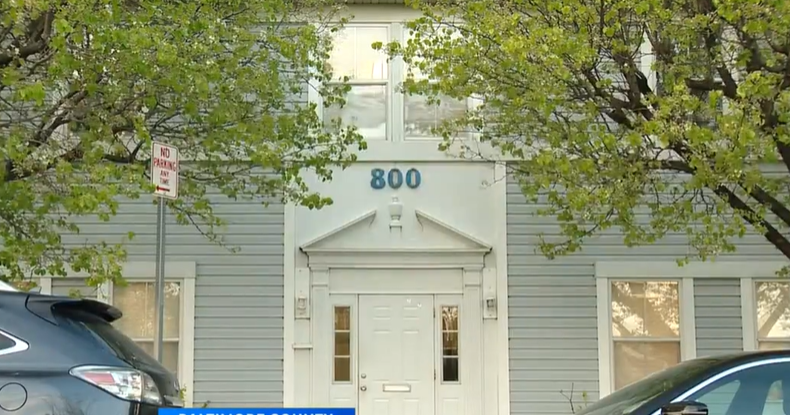DNA Exonerees Say Texas Unfairly Cut Compensation
AUSTIN (AP) - Before DNA tests proved his innocence, Ronald Taylor spent more than 14 years in prison for a Houston rape he did not commit.
Eligible for $80,000 in state compensation for every year he was wrongfully imprisoned, Taylor expected to restart his life with more than $1.1 million he was owed.
Instead, the state offered $20,000.
According to the state comptroller's office, which pays wrongful conviction claims, a strict reading of state law required Taylor to be paid for only three months of his prison time because of circumstances related to a prior conviction.
The comptroller also slashed payments to other wrongfully convicted Texans, including 20-year prisoner Billy James Smith, who lost more than $133,000 in compensation, and 18-year inmate Gregory Wallis, who lost almost $290,000.
After losing at least one-third of their lives to undeserved prison terms, all three men asked the Texas Supreme Court to intervene. They argue that the comptroller misapplied a well-intentioned law meant to compensate the wrongly accused for the emotional, physical and economic toll of prison.
"I really felt insulted when I went to prison for rape. That's probably the worst crime you could get convicted of," Taylor said from his Atlanta home. "But to offer me $20,000 to rebuild my life, man? Yeah, that's an insult, too. It really is."
Taylor turned down the state's offer, even though he could use the money.
His health declined in prison, he said, and now diabetes has made it impossible to continue a landscaping business he started.
"I just want to live," he said. "Nothing extravagant — I want to be able take my wife on the honeymoon I never took her on. I want to pay for my medication and not have to worry about it. I want to get a home. I want to be comfortable and get that part of my life behind me and move on with whatever is in front of me. That's it. That's all I want."
The payments to Taylor, Smith and Wallis were meant to atone for the state's mistakes. But they were reduced based on another principle: Crime shouldn't pay.
Texas law prevents wrongfully convicted prisoners from collecting money if they also served a concurrent sentence for another crime. In the cases before the Supreme Court, all three men were on parole when they were mistakenly convicted of rape-related charges, and all three had their parole revoked as a result.
According to lawyers for Comptroller Susan Combs, the men were still serving their original sentences when they were charged with rape — even though they were out of prison at the time — so the state cannot pay for any time the two sentences overlapped.
For Smith, the overlap lasted only 10 months, but it cost him $133,334 — half in cash, half in an annuity that earns 5 percent annual interest and pays out monthly for as long as he lives. Smith's cash compensation was $1.5 million.
But Taylor's earlier sentences for robbery and delivery of cocaine were not discharged until three months before his rape conviction was overturned — wiping out 14 years of time served, $1.12 million in cash and $1.12 million in an annuity.
"The statute says if you are serving a concurrent sentence the same time you are serving a wrongful sentence, you don't get compensation for it," Philip Lionberger, an appellate lawyer for Attorney General Greg Abbott, told the Supreme Court during Nov. 10 oral arguments.
But Kristopher Moore, an Odessa lawyer representing the three former inmates, said the state's interpretation of the law leads to an absurd result.
The only reason the three men's parole was revoked, leading to concurrent prison sentences, was that they were wrongfully convicted, he said.
"It makes no sense," Moore told the Supreme Court during arguments in Smith's case. "He was denied his liberty because of a wrongful conviction. He should not now be denied his compensation."
In 2009, with DNA tests reversing a growing number of convictions and with costly lawsuits on the rise, Texas legislators sweetened incentives for exonerated inmates who elect not to sue.
Those who had received a pardon or had a conviction overturned based on their innocence would be eligible for $80,000 for every year they were wrongfully imprisoned (up from $50,000), plus a matching annuity and college tuition.
The changes passed overwhelmingly after already exonerated inmates agreed to dismiss pending lawsuits in favor of the state money.
"Every single one of them stuck by their word," said Moore, whose law firm of Glasheen, Valles & Inderman represents 11 exonerated men. "We filed dismissals — even Taylor, Wallis and Smith, who did not get what they were expecting."
Denied full compensation by the comptroller's office, however, the three men appealed directly to the Texas Supreme Court, where they are seeking a writ of mandamus directing the agency to pay in full. The court accepted one case in August — Smith's, which happened to be the first filed — but any decision would apply to all three cases, plus two other exonerated inmates whose payments were cut because of concurrent sentences.
The Supreme Court decision is likely to turn on how the court interprets parole.
Is parole, as the comptroller and attorney general contend, merely a continuation of a criminal sentence that is served outside of prison?
If so, the state would not have to pay an exonerated inmate who was also on parole for an earlier crime — at least until the other sentence had been discharged, Lionberger said.
But Moore argued that a sentence ends when parole begins and the inmate leaves prison. If so, the sentence isn't reimposed until parole is revoked — which, for Taylor and the other men, happened after they were wrongfully arrested and convicted, he said.
It would be illogical and unfair to penalize inmates for serving a concurrent sentence that would not have been imposed except for the mistaken rape convictions, Moore said.
Complicating the comptroller's case is an attorney general's opinion related to the 1999 Tulia drug sweep, a botched affair that prompted Gov. Rick Perry to pardon 35 people whose convictions were tainted by misconduct by a prosecutor and an unsupervised undercover investigator.
One of those pardoned ended up serving concurrent prison sentences when his probation on an unrelated drug charge was revoked. Asked in 2007 whether the man could still receive state compensation for wrongful imprisonment, Abbott's office said yes.
During oral arguments, several Supreme Court justices asked about the apparent discrepancy between giving state money to somebody who was on probation but not somebody on parole.
"Both probation and parole are forms of conditional release, that is true, but it is not proper to say the two are the same," Lionberger responded.
"When someone receives a probated sentence, they don't actually serve a sentence. (The sentence) is probated; it is postponed," he said. "If you complete your probation, you will not have ever suffered a criminal sentence."
Parole, however, is offered to people who are serving a prison sentence, Lionberger said. Their sentences continue even after they're freed, he said, with custody simply transferring from the institutional division to the parole division of the Texas Department of Criminal Justice.
A round of skeptical questions followed.
Justice Paul Green said the distinction between parole and probation seemed largely semantic.
"As far as incarceration, there is no difference, is there?" Green asked.
Justice Nathan Hecht, noting that a probationer and a parolee are both out of prison, questioned whether there was "any practical difference" between the two forms of punishment.
Justices Don Willett and Eva Guzman asked why probation shouldn't be considered a sentence, noting that the state's highest courts, the Supreme Court and Court of Criminal Appeals, both refer to "people being sentenced to probation."
Justice David Medina was the most confrontational, dismissing as absurd Lionberger's argument that merely being on parole disqualified Smith from compensation because state law did not specify that concurrent sentences must be served in prison.
"That reasoning seems to be flawed. You seem to want us to disregard the fact that he was wrongfully imprisoned," Medina said.
The court has no deadline to decide Smith's case but typically takes about 13 months to issue a ruling after oral arguments.
(Copyright 2010 by The Associated Press. All Rights Reserved.)







